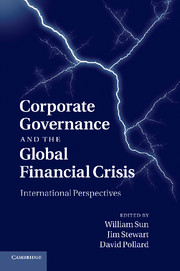Book contents
- Frontmatter
- Contents
- Figures
- Tables
- Contributors
- Acknowledgements
- 1 Introduction: rethinking corporate governance – lessons from the global financial crisis
- Part I The failure of the market approach to corporate governance
- 2 Corporate governance causes of the global financial crisis
- 3 The failure of corporate governance and the limits of law: British banks and the global financial crisis
- 4 Where was the ‘market for corporate control’ when we needed it?
- 5 Information asymmetry and information failure: disclosure problems in complex financial markets
- 6 Finance, governance and management: lessons to be learned from the current crisis
- Part II Ownership, internal control and risk management: the roles of institutional shareholders and boards
- Part III Post-crisis corporate governance: the search for new directions
- Index
- References
6 - Finance, governance and management: lessons to be learned from the current crisis
Published online by Cambridge University Press: 05 August 2011
- Frontmatter
- Contents
- Figures
- Tables
- Contributors
- Acknowledgements
- 1 Introduction: rethinking corporate governance – lessons from the global financial crisis
- Part I The failure of the market approach to corporate governance
- 2 Corporate governance causes of the global financial crisis
- 3 The failure of corporate governance and the limits of law: British banks and the global financial crisis
- 4 Where was the ‘market for corporate control’ when we needed it?
- 5 Information asymmetry and information failure: disclosure problems in complex financial markets
- 6 Finance, governance and management: lessons to be learned from the current crisis
- Part II Ownership, internal control and risk management: the roles of institutional shareholders and boards
- Part III Post-crisis corporate governance: the search for new directions
- Index
- References
Summary
Queen Elizabeth II's request for explanations of the contemporary financial crisis affecting the whole world was widely reported in the press (Le Monde, 28 July 2009). ‘Why didn't anybody notice?’ the Queen was reported to have asked during a visit to the London School of Economics. The convoluted answer from the celebrated institution's professors deserves to be quoted: ‘The failure to foresee the timing, extent and severity of the crisis and to head it off, while it had many causes, was principally a failure of the collective imagination of many bright people, both in this country and internationally, to understand the risks to the system as a whole’ (British Academy Forum, 2009).
Yet there were people who had seen how the system was veering out of control and predicted its inevitable implosion. A certain number of researchers had been highly critical of the way finance was developing and the risk that those developments would lead the system off course. The criticisms came from a range of scientific and social areas: economics (e.g., Orléan, 1999; Shiller, 2000; Aglietta and Rebérioux, 2004; Morin, 2006; Akerlof and Shiller, 2009), sociology (e.g., MacKenzie, 2006), philosophy of economics (e.g., Jorion, 2008), mathematics (e.g., Mandelbrot, 1997; Mandelbrot and Hudson, 2004) and finance practitioners (e.g., Soros, 1998; Taleb, 2007). Most of them pointed out that finance activities do not belong to simple models such as those that are widely used in practice.
- Type
- Chapter
- Information
- Corporate Governance and the Global Financial CrisisInternational Perspectives, pp. 113 - 128Publisher: Cambridge University PressPrint publication year: 2011



